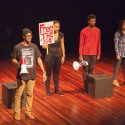From awareness to activism, events aim to stop sexual violence
As April is nationally recognized as Sexual Assault Awareness Month, several activities on and off campus will address community responsibility for ending sexual violence at the University of Wisconsin–Madison.
Through UW–Madison’s End Violence on Campus (EVOC, pronounced “evoke”) initiative, campus stakeholders are working to eliminate the barriers students face in seeking help or reporting and strengthen the infrastructure of services on campus. The initiative aims to change the societal norms surrounding gender and power that allow sexual violence to be perpetuated.
“Student leadership is crucial in these efforts,” says Carmen Hotvedt, violence prevention specialist at University Health Services. “It can start with what some might consider simple tasks: believing survivors, understanding how to give and get consent, knowing what services are available to victims and intervening in sexist comments.”
One in four women experience sexual assault prior to graduation or leaving college. As few as 5 percent of these women report their assaults to university law enforcement or campus security officials. Though women make up the majority of sexual assault victims, men and members of LGBT communities experience sexual violence, too. Moreover, assault can have a profound effect on social and intimate relationships with others — even if the assault remains secret.
In this light, all members of the campus community have a role to play in prevention. As with the women represented in victimization studies, the crimes are often perpetrated by someone the victim knows.
“An assault survivor may have many reasons to choose not to disclose his or her experience to campus law enforcement,” says Hotvedt. “They might fear retaliation from the perpetrator, not being believed or not knowing how to access services.”
Many victims, however, do seek help from and talk to peers, counselors, medical professionals, housing staff and TAs. According to 2010 data, 112 UW–Madison students made disclosures about a sexual assault to a university employee — a higher number than in years past. Of these, eight meet criteria outlined in the Federal Campus Safety Act.
While this appears to indicate an increase in violence, it may actually represent a positive step toward recognizing and preventing assault. Increased prevention efforts, such as an online program for first-year students, may account for more students seeking out help on campus.
Victims of sexual assault have a wide variety of options available to them in their healing process at UW–Madison, including the local nonprofit Rape Crisis Center, which has an office located on campus. A 24-hour hotline is available at 608-251-RAPE.
Campus events during April include:
- Wednesday-Thursday, April 13-14: The Havens Center presents a special event, “To Gain Title to our Bodies: Race, Rape and Resistance from the Civil War to the Civil Rights Movement.” Scholars Danielle McGuire (formerly of UW–Madison) and Crystal Feimster present two lectures and an open seminar for students, faculty and the public. Lecture descriptions and locations are available here.
- Wednesday, April 13: “Break the Silence Around Violence” is a workshop exploring sexual and dating violence in LGBT communities. 7 p.m., A1 Gordon Commons, 717 W. Johnson St.
- Monday, April 18: “Stopping Sexual Assault” features Sarah Rice from MTV’s “Real World: Brooklyn” and spoken-word artist Steve Connell. 7 p.m., 2103 Chamberlin Hall, 1150 University Ave.
- Wednesday, April 20: EVOC (End Violence on Campus) Coordinating Council meeting. 1:30 p.m., fourth floor, Student Activities Center, 333 East Campus Mall.
Tags: events, student life, UW-Madison Police


